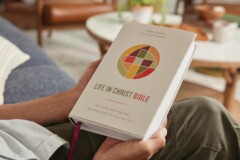We all have some familiarity with that deep, gnawing, pit-of-the-stomach anxiety, that stubborn worry that refuses to abate. The cause and effect may be a little different for each one of us, but we all have a time and a place and set of circumstances that causes us to be anxious.
In his book Running Scared, Ed Welch makes 4 fascinating observations about worriers and their brand of vision-casting.
Worriers Live in the Future
Worriers live in the future. We are all people of the past, present and future, and worry has a way of spanning all three time zones. Fear is often triggered by past events, then reacts to crises in the present, and anticipates their consequences in the future. Fear’s preference, though, is to point you to the future, and to do this it relies upon the power of imagination.
We tend to think that imagination is the realm of the child, but it is equally the realm of the worrier. We have imaginations so we can consider things that do not yet exist. We admire people with expansive imaginations as visionaries, people who are able to look ahead and anticipate the trajectory of the nation, of the church, of the business, or of the individual. The worrier is a visionary too, in that he sees, or thinks he sees, the future, and what it will bring. He lives in the future. He creates a vision of the future, he transplants himself there in his mind, and he feels all the traumatic emotions associated with it.
Worriers See the Future in Minute, Gory Detail
“Worriers are visionaries minus the optimism.”
Worriers live in the future, and they see that future in minute, gory detail. I cannot say it better than Welch: “Worriers are visionaries minus the optimism.” That stings. Where a visionary has an optimistic view of the future based on his ability to see current patterns and predict a better alternative, a worrier sees the future in great detail, but always in gory detail. When she anticipates tomorrow’s medical appointment, she is already living in a future where her child is battling cancer and succumbing to it. When she sees her child pulling out of the driveway, she catches a vision of twisted metal and broken bodies. She sees the future, but she sees it as bleak and disappointing.
Worriers Are False Prophets
Worriers are always looking to the future—a future that is tragic and brutal.
Worriers are always looking to the future—a future that is tragic and brutal. The worrier takes upon himself a kind of prophetic role and allows his occasional successes in accurately predicting that awful future to establish his reputation as a person who understands what others miss. He believes he knows what the future will bring and he will be amazed, and perhaps even infuriated, that others do not see what he sees. It becomes his job to worry for those who will not.
Yet as the worrier glimpses this future, he is always wrong, at least in some of what he sees. Even in those few occasions that he is correct in the big picture—if a man spends his whole life worrying about the people he loves befalling medical misfortune, sooner or later that prediction will be right—he is still wrong in many of the details. The success rate is pathetic. In the Old Testament the people who talked about the future and foretold doom were known as prophets. The only way a prophet could maintain his credibility was to be infallible, to get every prediction correct in its every detail. Perhaps worriers would do well to stop excusing themselves by saying, “I am just a worrier” and instead declare, “I am a prophet.”
Worriers Are Immune to Reason
Finally, worriers are immune to reason. As worry is added to worry, as anxiety compounds and leads to irrational behavior, loved ones try to help. They explain that worry has never accomplished anything or ever made a situation any better; they show and explain that worry is more like astrology than prophecy. When nothing else helps, they may try to fix the problem by securing the environment—buying a dog or installing an alarm, or eating healthier. But this kind of security can do no more than briefly hold the worry at bay. Sooner or later it will return, because worry is irrational, resistant to reason. It’s impossible to reason a person out of an irrational position.
The Response
So what do we do for the worrier? What do we do if we are the worrier? Welch says,
Take a hard look at yourself instead of your circumstances when worry is blaring. Ask yourself what you are trusting in. Consider your poor track record for predictions, yet recognize that all these steps, while they may give some hope, still don’t push back the boundaries of fear and worry. Reason alone can’t do it. Face the reality that we have to go outside ourselves for an answer and seek the God who is in control.










